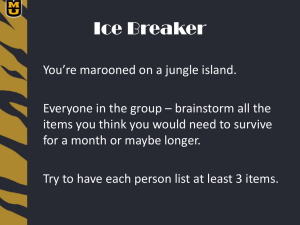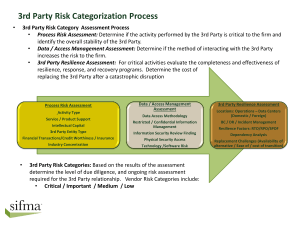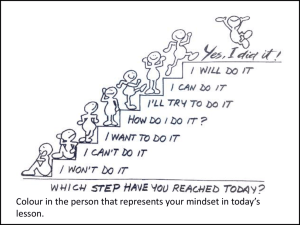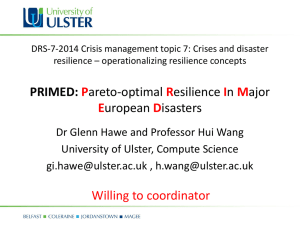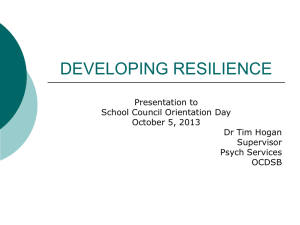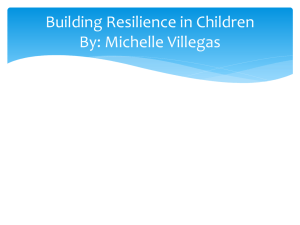G.Windle `Is it worth taking the trouble to study resilience`
advertisement
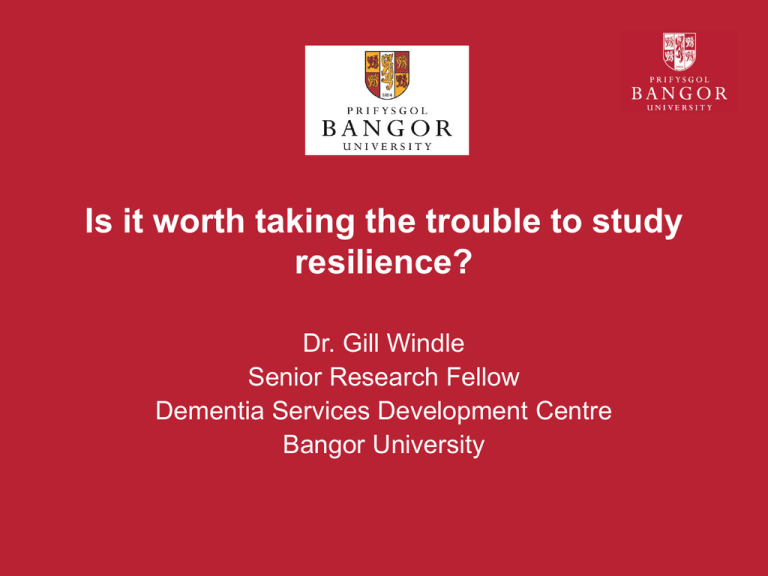
Is it worth taking the trouble to study resilience? Dr. Gill Windle Senior Research Fellow Dementia Services Development Centre Bangor University Is it worth taking the trouble to study resilience? • • • • What is resilience? Do we need to measure it? How can we measure resilience? Can creative activities support resilience, and if so, how do they do this? Background PhD 2003-2006 ‘Variations in well-being: the role of psychological resilience in older age’ (ESRC Studentship) Longitudinal study (n=3500) – My work is looking at resilience from age 65+ in relation to illness, disability and cognitive impairment, using quantitative and qualitative methods (ESRC £3.3m; 2010-2016) Challenges and Healthy Ageing: The Role of Resilience Across the Life-course’ (Medical Research Council, 2010) ‘Lifestyle Matters for Health and Well-Being’. RCT of a health promotion intervention (n=400 ). Promoting resilience age 65+ (MRC LLHW £1.3m 2012-2015). Historical Context • The study of resilience is not new • Early studies focussed on the origins of mental illness in children – looked at the wide variability in outcomes • ‘Psychosocial resilience and protective mechanisms’ (Rutter, 1987) • Protective factors and processes BUT.. a lot of the theoretical development to date has been undertaken from observations with children “It is a vague concept and difficult to define” • Consensus from research regarding difficulties in developing a single definition of resilience • Prevalence of resilience – between 25% to 84% (Vanderbilt-Adriance & Shaw, 2008) • Strength – disciplinary diversity in the study – it can be explored in different populations, contexts and scientific disciplines Method Research from the challenges and healthy ageing team • Stakeholders and academics in discussion • Literature Review using systematic principles – searched academic journals, policy documents, internet. • Applied concept analysis to clarify the definition of resilience Windle, G., & The Resilience Network. (2011). What is resilience? A review and concept analysis. Reviews in Clinical Gerontology, 21 (2), 151-16. • A quantitative methodological review of resilience measurement scales Windle, G., Bennett, K. and Noyes, J. (2011). A methodological review of resilience measurement scales. BMC Health and Quality of Life Outcomes. 9 (8), d oi:10.1186/1477-7525-9-8 Definition • Resilience is the process of negotiating, managing and adapting to significant sources of stress or trauma. Assets and resources within the individual, their life and environment facilitate this capacity for adaptation and ‘bouncing back’ in the face of adversity. Across the life course, the experience of resilience will vary.’ Doing okay or even quite well despite illness and disability Concept clarification Windle, G. (2011). What is resilience? A review and concept analysis Reviews in Clinical Gerontology, 21 (2), 151-169. http://journals.cambridge.org/repo_A81iOgzq Essential requirements for resilience 1. There must be a major risk or adversity that carries a significant threat for the development of a poor outcome 2. Poor outcomes as a result of the adversity are not experienced; the maintenance of normal development or functioning, such as physical or mental health, or better than expected development or functioning, in the face of adversity. This is often referred to as positive adaptation. 3. There are supportive aspects within the individual’s life and environment that facilitate the capacity for adaptation to adversity (or constitute a risk) – what is present in someone’s life that supports a good outcome? Example of a resilience framework Measuring Resilience • Assessments of resilience need to consider: I. a) the risk or adversity II. b) assets/resources that might offset the effect of the risk III. c) the outcome • Quantitative direct measurement – using a resilience measurement scale as an outcome measure • Quantitative indirect measurement – modelling a range of data with multivariate statistics • Qualitative – understanding individual experiences Promoting resilience through creative activities • Who are the focus of your activities? • What is their adversity? • Why do you think creative activities might build resilience? (your ‘theory’) • How might they benefit from a resilience promoting activity? • How will you know they have benefited? Why do you think creative activities might build resilience? Cognitive Reserve Hypothesis Creative Activities New skills/learning Social connections/networks Efficacy Cognitive Health Conclusion • Is it worth taking the trouble to study resilience? YES! • “Nonetheless, it remains the case that progress on delineating resilience processes with the precision that Rutter and other pioneers hoped for will require close attention to conceptual and measurement issues” (Masten, in press). Diolch yn fawr/Thank you Dr. Gill Windle, Senior Research Fellow Dementia Services Development Centre Bangor University g.windle@bangor.ac.uk


